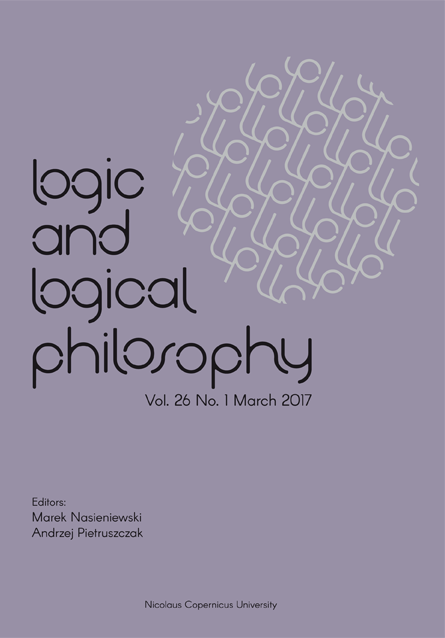Vagueness is a Kind of Conflation
DOI:
https://doi.org/10.12775/LLP.2016.020Słowa kluczowe
conflation, vagueness, nontransitive logic, tolerance, borderline casesAbstrakt
This paper sketches an understanding of conflation and vagueness according to which the latter is a special kind of the former. First, I sketch a particular understanding of conflation. Then, I go on to argue that vague concepts fit directly into this understanding. This picture of vagueness is related, but not identical, to a number of existing accounts.Bibliografia
Alxatib, S., and J. Pelletier, “The psychology of vagueness: Borderline cases and contradictions” Mind and Language, 26, 3 (2011): 287–326. DOI: 10.1111/j.1468-0017.2011.01419.x
Brandom, R., “The significance of complex numbers for Frege’s philosophy of mathematics”, Proceedings of the Aristotelian Society, 96 (1996): 293–315.
Brandom, R., Articulating Reasons, Harvard University Press, Cambridge, Massachusetts, 2000.
Burgess, J.A., “Error theories and values”, Australasian Journal of Philosophy, 76, 4 (1998): 534–552. DOI: 10.1080/00048409812348661
Camp, J.L., Jr., Confusion: A Study in the Theory of Knowledge, Harvard University Press, Cambridge, Massachusetts, 2002.
Cobreros, P., P. Égré, D. Ripley, and R. van Rooij, “Tolerant, classical, strict”, Journal of Philosophical Logic, 41, 2 (2012): 347–385. DOI: 10.1007/s10992-010-9165-z
Cobreros, P., P. Égré, D. Ripley, and R. van Rooij, “Pragmatic interpretations of vague expressions: Strongest meaning and nonmonotonic consequence”, Journal of Philosophical Logic, 44, 4 (2015): 375–393. DOI: 10.1007/s10992-014-9325-7
Cobreros, P., P. Égré, D. Ripley, and R. van Rooij, “Vagueness, truth, and permissive consequence”, Chapter 21, pages 409–430, in T. Achourioti, H. Galinon, K. Fujimoto, and J.M. Fernández (eds.), Unifying the Philosophy of Truth, volume 36 of the series Logic, Epistemology, and the Unity of Science, Springer, 2015. DOI: 10.1007/978-94-017-9673-6_21
Égré, P., V. de Gardelle, and D. Ripley, “Vagueness and order effects: Evidence for enhanced contrast in a task of color categorization”, Journal of Logic, Language, and Information, 22, 4 (2013): 391–420.
Fara, D., “Shifting sands: An interest-relative theory of vagueness” Philosophical Topics, 28, 1 (2000): 45–81.
Field, H., “Theory change and the indeterminacy of reference”, Journal of Philosophy, 70, 14 (1973): 462–481. (See also DOI: 10.1093/0199242895.003.0006)
Field, H., “Indeterminacy, degree of belief, and excluded middle”, Noûs, 34, 1 (2000): 1–30. DOI: 10.1111/0029-4624.00200
Frost-Arnold, G., “Too much reference: Semantics for multiply signifying terms”, Journal of Philosophical Logic, 37, 3 (2008): 239–257. DOI: 10.1007/s10992-007-9067-x
Kamp, H., “The paradox of the heap”, Chapter 8, pages 225–277, in U. Mönnich (ed.), Aspects of Philosophical Logic, D. Reidel, 1981. DOI: 10.1007/978-94-009-8384-7_8
Keefe, R., Theories of Vagueness, Cambridge University Press, Cambridge, 2000.
Lawlor, K., “A notional worlds approach to confusion”, Mind & Language, 22, 2 (2007): 150–172. DOI: 10.1111/j.1468-0017.2007.00304.x
Millikan, R.G., On Clear and Confused Ideas, Cambridge University Press, Cambridge, 2000. DOI: 10.1017/CBO9780511613296
Raffman, D., “Vagueness without paradox”, The Philosophical Review, 103, 1 (1994): 41–74. DOI: 10.2307/2185872
Raffman, D., “Vagueness and context-relativity”, Philosophical Studies, 81, 2–3 (1996): 175–192. DOI: 10.1007/BF00372781
Ripley, D., “Contradictions at the borders”, Chapter 10, pages 169–188, in R. Nouwen, R. van Rooij, H.-Ch. Schmitz, and U. Sauerland (eds.), Vagueness and Communication, Volume 6517 of the series Lecture Notes in Computer Science, Springer, 2011. DOI: 10.1007/978-3-642-18446-8_10
Ripley, D., “Paradoxes and failures of cut”, Australasian Journal of Philosophy, 91, 1 (2013): 139–164. DOI: 10.1080/00048402.2011.630010
Ripley, D., “Revising up: Strengthening classical logic in the face of paradox”, Philosophers’ Imprint, 13, 5 (2013): 1–13.
Ripley, D., “Sorting out the sorites”, Chapter 18, pages 329–348, in K. Tanaka, F. Berto, E. Mares, and F. Paoli (eds.), Paraconsistency: Logic and Applications, Volume 26 of the series Logic, Epistemology, and the Unity of Science, Springer, 2013. DOI: 10.1007/978-94-007-4438-7_18
Ripley, D., “Blurring: An approach to conflation”, Notre Dame Journal of Formal Logic, 2016. Forthcoming.
Sellars, W., “Inference and meaning”, Mind, 62, 247 (1953): 313–338.
Serchuk, P., I. Hargreaves, and R. Zach, “Vagueness, logic, and use: Four experimental studies on vagueness”, Mind & Language, 26, 5 (2011): 540–573. DOI: 10.1111/j.1468-0017.2011.01430.x
Shapiro, S., Vagueness in Context, Oxford University Press, Oxford, 2006. DOI: 10.1093/acprof:oso/9780199280391.001.0001
Sorensen, R., Vagueness and Contradiction, Oxford University Press, Oxford, 2001.
Williamson, T., Vagueness, Routledge, London, 1994.
Wright, C., “On the coherence of vague predicates”, Synthese, 30, 3–4 (1975): 325–365. DOI: 10.1007/BF00485049
Pobrania
Opublikowane
Jak cytować
Numer
Dział
Statystyki
Liczba wyświetleń i pobrań: 590
Liczba cytowań: 0







